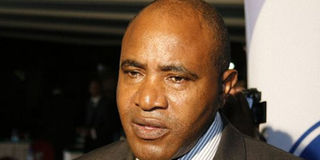CCK repossess idle frequencies

CCK director-general, Charles Njoroge. Photo/FILE
Panic gripped the broadcasting sector on Wednesday when it emerged that the industry regulator, the Communication Commission of Kenya, had cancelled idle radio and television frequencies.
Mr Charles Njoroge, CCK director-general, confirmed that the actual cancellation started on Tuesday and a full list of those affected will be released this week.
“Radio is the most affected as the demand for the frequencies is very high. We have a long list of investors in radio but there are no more frequencies to award,” Mr Njoroge said on Wednesday.
Last year alone a total of 268 radio frequencies had been licensed, but only about a-third are in use.
Over the past few years since the liberalisation of the telecoms industry, there has been a dramatic growth in FM stations in Kenya, but the director-general, says most of the licences are idle and will be cancelled and given to genuine investors.
Industry sources say that most of the affected frequencies are for the upcountry, which are bought for speculative purposes.
Last year alone, according to the Economic Survey 2009, the broadcasting sector experienced increased demand for frequencies.
CCK assigned a total of new 30 FM frequencies out of 295 applications for FM broadcasting.
The number of applicants awaiting allocation for TV frequencies increased from 143 in 2007 to 192 in 2008.
Kenya has set 2012 as the year of transition ahead of the 2015 global deadline to digital broadcasting.
Mr Njoroge says the commission has already licensed one digital television operator and the number is expected to increase by next year.
CCK assigned nine TV broadcast channels to Digital; Video Broadcasting-handheld (DVB-H) but a number of assigned frequencies were recalled due to non-utilisation.
This resulted to the total number of frequencies in operation dropping from 127 in 2007 to 81 in 2008.
Radio frequencies in use dropped from 368 in 2007 to 268 last year.
Mr Njoroge says that CCK is on with the preparatory process of the transition from analogue to digital TV broadcasting.
It is anticipated that the transition would help in reducing the number of applicants and those on waiting list due to spectral efficiency of Digital technology.




